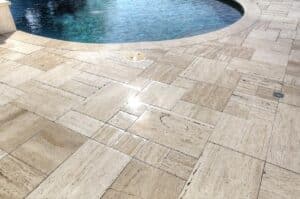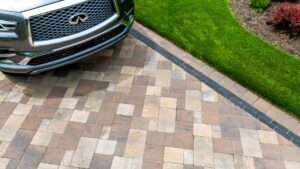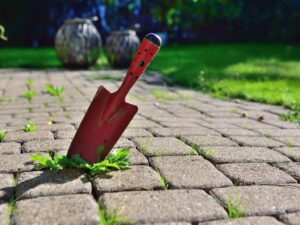In recent decades, pavers have become the most popular choice for outdoor spaces. And for good reason – as they can transform your driveway, patio, or garden into a stunning and functional area. But how to care for pavers – what do homeowners need to know about paver maintenance?
Paver maintenance is essential to ensure that your pavers remain as beautiful and durable as the day they were installed. So, in this article, we want to explore the art of paver maintenance, discussing why it matters and offering practical tips for preserving your outdoor beauty.
Our goal is to give you a complete rundown of the best paver practices and products to use with all the different paver materials out there. After reading this article, we guarantee you’ll be ready to care for any type of paver. So let’s get right to it!
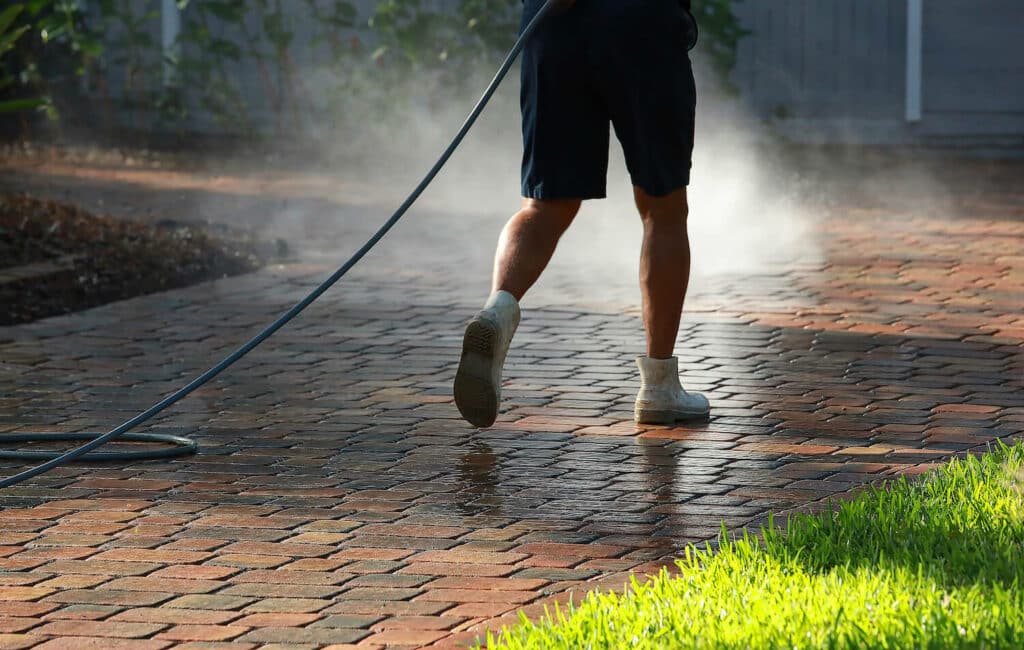
Paver maintenance: Why is it so important?
Paver maintenance goes far beyond mere aesthetics; it serves as a safekeeping of your investments, ensuring that your hardscape spaces stand the test of time.
From enhancing the visual appeal of your property to safeguarding the durability and safety of your outdoor environment, there are numerous compelling reasons why paver maintenance is absolutely crucial.
For starters, well-maintained pavers significantly elevate the visual charm of your property.
Whether your outdoor space is intended for personal enjoyment or designed to impress guests and potential buyers, pristine pavers create an inviting and alluring atmosphere. These elegant surfaces, when consistently cared for, are bound to make a lasting impression.
While pavers are engineered to withstand the assault of the elements, they are not invincible at all. Proper maintenance plays a pivotal role in extending their lifespan – and this means fewer replacements and reduced costs in the long run. By preserving the structural integrity of your pavers, you not only protect your investment but also maintain the functionality of your outdoor spaces for generations to come.
Moreover, neglected pavers can also pose significant safety risks. Over time, they may become uneven, creating an environment ripe for tripping hazards. Regular maintenance ensures that your outdoor spaces remain safe for you, your family, and your guests – serving as a proactive step in safeguarding against accidents and potential liabilities.
Another aspect to consider is that without proper maintenance weeds, moss, and other unwanted vegetation can infiltrate the gaps between pavers, causing structural issues and an unsightly appearance.
They can weaken the pavers and compromise their stability. So proper maintenance, which includes joint sand replacement and weed control, can prevent weed growth and the subsequent need for extensive and expensive repairs.
In the realm of outdoor space care, maintaining your pavers proves to be remarkably cost-effective. After all, regular care is undeniably more budget-friendly than replacing entire paver systems. Routine cleaning, sealing, and minor repairs can prevent minor issues from escalating into major problems, saving you both time and money in the long term.
The different types of paving stones
To keep things organized, we are going to dedicate an exclusive to each of the four most popular types of pavers currently on the market: concrete, brick, natural stone, and porcelain.
Don’t miss: Do you know what’s the best paver for a fire pit?
Concrete paver maintenance
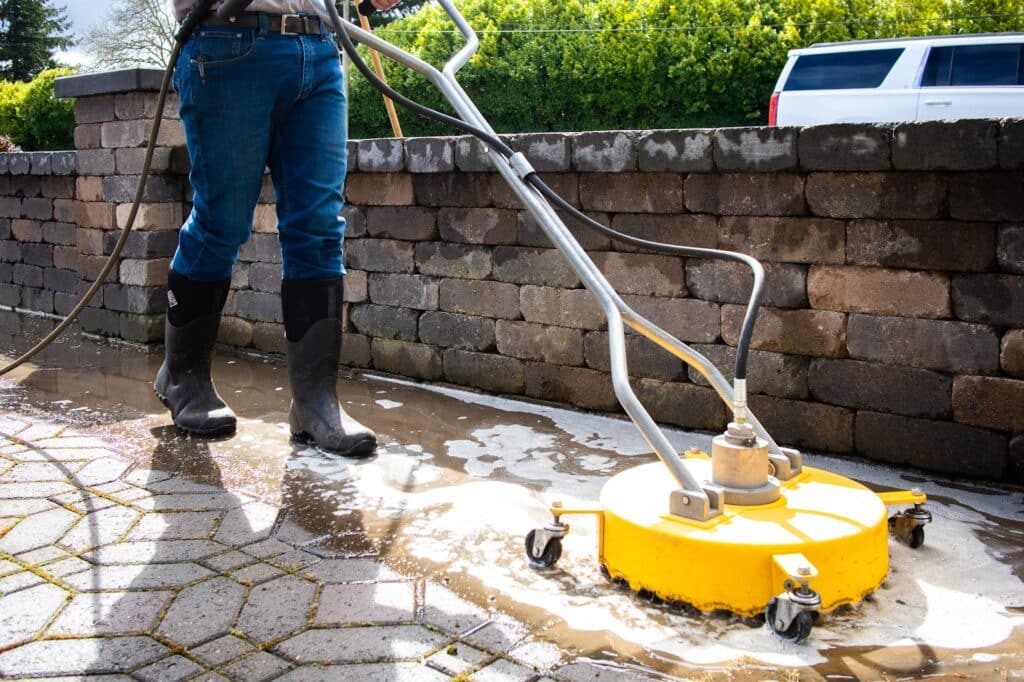
Maintaining the longevity and aesthetic appeal of your concrete pavers is of utmost importance, and regular cleaning plays a pivotal role in achieving this.
Concrete pavers can accumulate dirt, debris, and organic matter over time, diminishing their visual appeal and potentially causing structural issues. Therefore, it’s essential to adopt a systematic and proactive approach to paver maintenance.
Regular sweeping is the simplest yet most effective method for concrete paver maintenance.
Utilize a broom with stiff bristles to remove loose materials, such as leaves, dirt, and gravel. This basic task prevents these elements from becoming ingrained in the paver’s surface, where they can lead to surface abrasions and other forms of damage over time.
While sweeping is excellent for day-to-day maintenance, occasional deep cleaning is essential to rejuvenate your concrete pavers.
Pressure washing, also known as power washing, is a highly efficient method for this purpose. A pressure washer uses a strong stream of water to dislodge embedded dirt, stains, and even mildew.
When using a pressure washer on your pavers, there are a few important considerations to keep in mind:
- Choose a wide fan tip for the pressure washer. A wide fan tip helps to disperse the pressure over a larger area, preventing concentrated force that could damage the paver’s surface.
- Adjust the pressure to a moderate level. Excessive pressure can harm the pavers, causing cracks or removing the top layer, which holds the color and texture.
- Maintain a consistent distance between the pressure washer nozzle and the paver surface. Typically, a distance of around 12 to 18 inches is recommended to avoid damaging the pavers while ensuring thorough cleaning.
- If your pavers have stubborn stains, you can consider using specialized concrete or paver cleaners. These cleaners are often designed to work in conjunction with the pressure washer, making it easier to remove stains and grime.
Sealing your concrete pavers is another essential step in their maintenance. Sealers help protect the pavers from stains, UV damage, and water infiltration – also enhancing the pavers’ color and making cleaning easier.
Choose a quality paver sealer that suits your specific needs, whether it’s enhancing the natural appearance or providing a high-gloss finish. Apply the sealer according to the manufacturer’s instructions, typically using a roller or sprayer.
Reapply the sealer every 2-3 years or as needed, especially in high-traffic areas.
Brick paver maintenance
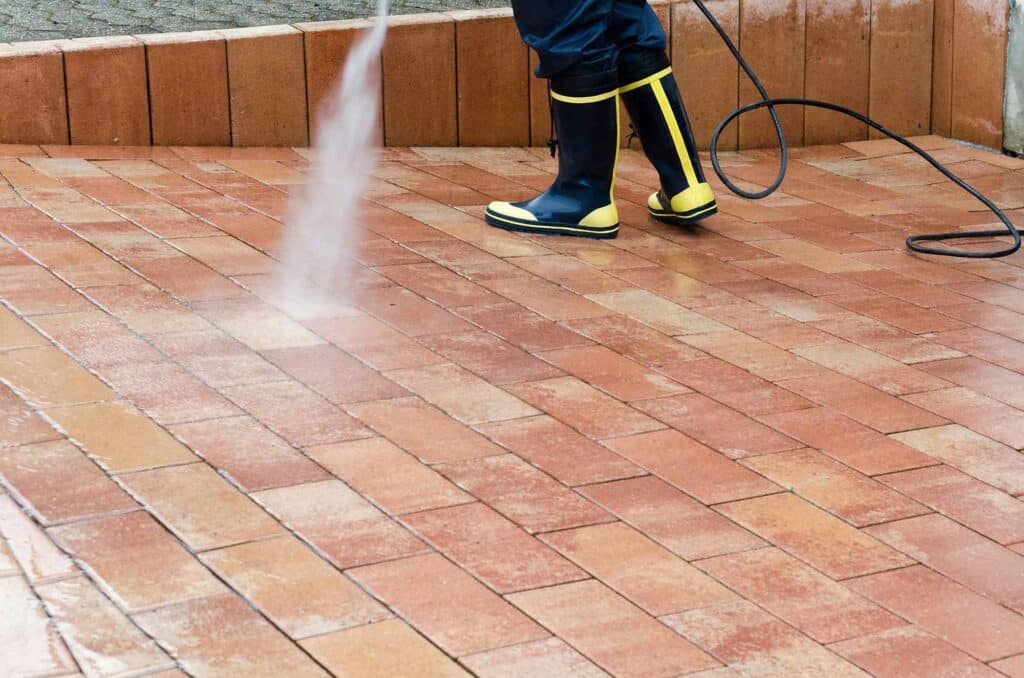
Brick pavers are a timeless choice for driveways, walkways, patios, and outdoor living spaces. They exude classic charm, provide a durable surface, and can enhance the aesthetic appeal of your property. However, to keep them looking their best and extend their lifespan, regular maintenance is essential.
Regular sweeping of your brick pavers with a stiff broom is crucial to loose dirt, leaves, twigs, and other debris.
By eliminating loose particles, you prevent them from grinding into the surface when walked or driven over. This can help prevent scratches and premature wear and tear, preserving the pavers’ visual appeal and structural integrity.
If your pavers have any specific stains, like oil, mildew, algae, or moss, you may need to employ targeted cleaning products specifically for bricks.
For a deeper cleaning, consider using a pressure washer with a low-pressure setting. Refer to the pressure washer considerations on the concrete paver maintenance for more detailed information on nozzle adjustments.
It’s important to establish a regular maintenance schedule for your brick pavers. Depending on your climate and how heavily the pavers are used, this might range from a few times a year to annually.
Consistent upkeep will prevent the buildup of stubborn stains and grime, extending the life of your pavers and preserving their vibrant appearance. By the way, consider applying a sealer to your brick pavers as well. Sealing is a crucial step to protect them from the elements, prevent staining, and enhance their color.
Make sure your pavers are clean and dry before applying sealer and select a sealer suitable for your pavers, between water-based or solvent-based sealers, each with its advantages. Be sure to follow the manufacturer’s instructions for application and drying times.
Sealers have a limited lifespan and may need reapplication every 2-5 years, depending on the type of sealer and exposure to weather elements.
Natural stone paver maintenance
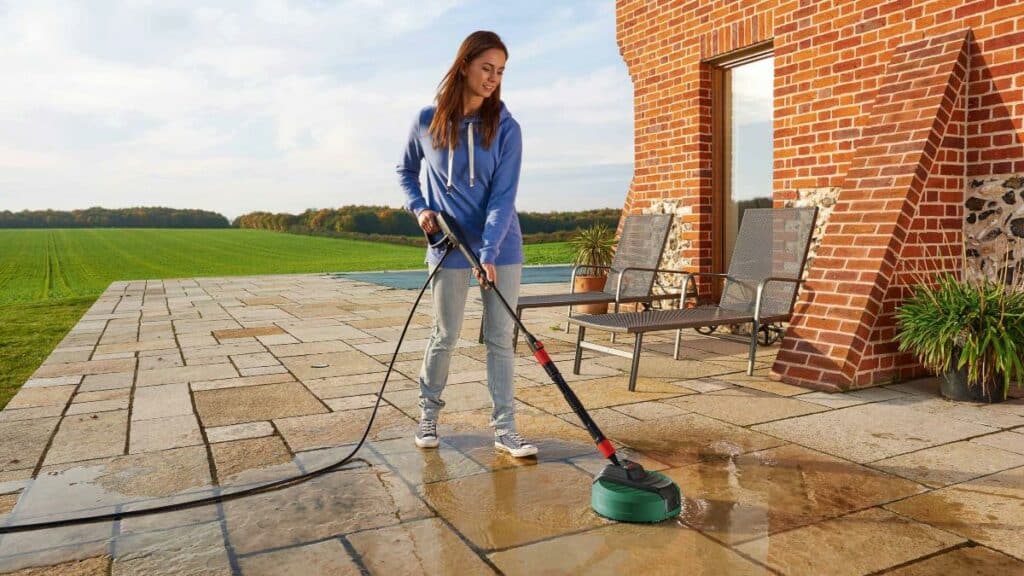
Natural stone pavers are prized for their inherent beauty and versatility. They come in a variety of materials, including limestone, granite, travertine, sandstone, and slate, each with its unique color, texture, and character.
Regular cleaning is the first line of defense when it comes to preserving the beauty of your natural stone pavers. Removing debris, leaves, and dirt that accumulate on the surface is paramount, as these can create stains and become abrasive over time.
However, unlike other pavers, sweeping is not recommended, as it can scratch the pavers. In the case of natural stone pavers, using a leaf blower to blow away the debris is much more recommended.
Pressure washing should also be avoided – opt instead for a garden hose with a gentle spray nozzle for effective yet safe cleaning.
Stains from oil, food, or organic matter can change the appearance of your pavers. Promptly address any stains by using stone-specific cleaners. Avoid using harsh chemicals, abrasive brushes, or DIY recipes, as they can damage the stone’s surface.
Just like concrete and brick, sealing your natural stone pavers is essential for long-term maintenance. A high-quality stone sealer provides a protective barrier against water penetration, stains, and UV damage.
The frequency of resealing depends on the type of stone and the level of exposure to the elements, but a general guideline is every 1-3 years.
Porcelain paver maintenance
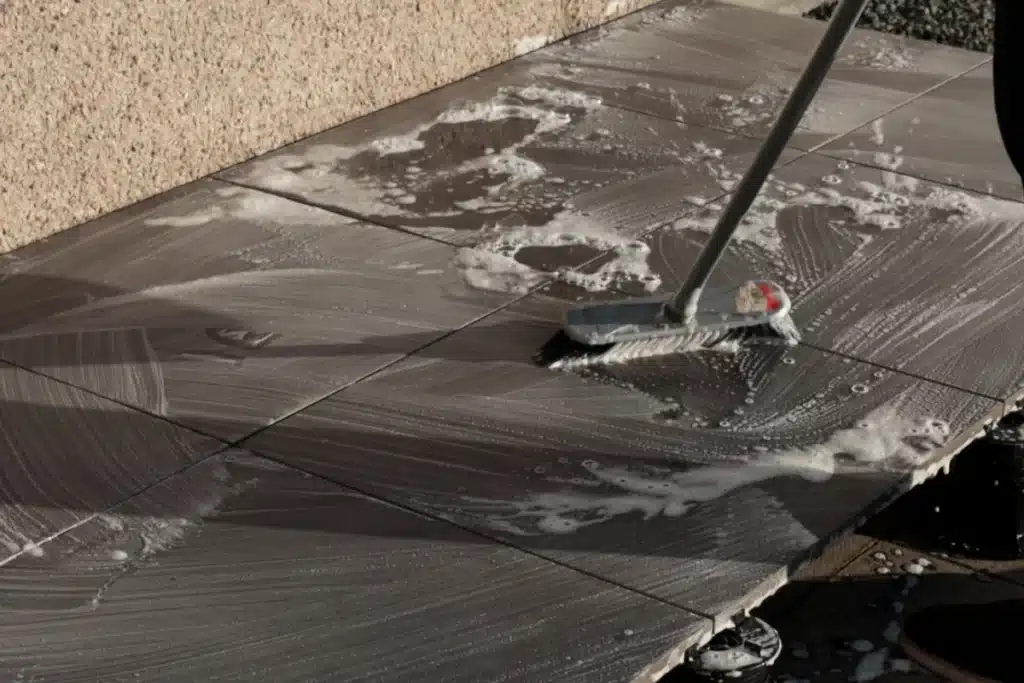
Porcelain pavers have become a popular choice for outdoor spaces in recent years due to their unmatched durability, aesthetics, and extremely low maintenance requirements when compared to other pavers.
The simplest way to maintain porcelain pavers is to regularly sweep away dirt, leaves, and debris. Occasionally, if you want a deeper cleaning, you can use a garden hose, a pressure washer (on low setting), or a mop with a mild detergent to clean the pavers periodically.
Porcelain pavers are resistant to most stains, but it’s still essential to clean up spills promptly. The best way to go about it is to use a mixture of water and a gentle cleaning solution for stubborn stains. Avoid harsh chemicals or abrasive cleaning tools, as these can damage the pavers.
But by far, the best aspect of porcelain pavers is that they are naturally impervious, so they don’t require sealing. That alone makes the entire maintenance process of porcelain pavers way easier.
Professional paver maintenance
Paver maintenance is more than just a routine chore; it’s an investment in the long-term health and aesthetics of your outdoor spaces. The best way you can ensure your pavers are as well maintained as possible is to hire professionals to help you.
By entrusting the care of your pavers to experienced professionals, you can ensure the longevity, safety, and aesthetics of your outdoor spaces.
Whether for residential driveways, patios, or commercial walkways and parking lots, investing in professional paver maintenance is a wise decision that pays off in terms of both cost savings and visual appeal.
That is the kind of service we here at S&S Pavers have been providing for the past 13 years around the Sarasota and Manatee counties, in FL. We know firsthand the importance of good maintenance when it comes to pavers, so hire a professional nearby whom you can trust to help you.
And if you happen to be around our area of activity, you can always contact us to provide that help for you. We’ll be waiting!

